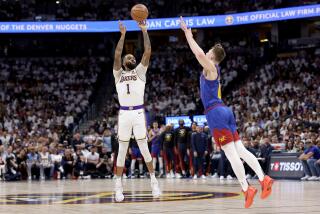It’s Clear Webber Needs to Do More
- Share via
In this Laker opening victory, the statistics of Sacramento’s Chris Webber were like one of those Brazilian thong bikinis: They conceal as much as they reveal.
Yes, his numbers were impressive. But they were also a little like what the Texans say about the cattle business--all hat and no money.
It’s easy to coach from a Lazyboy, and I’m about to do my best work ever from that position for the rest of the Lakers’ playoff season.
Webber’s a great player, but you almost have to be better than great--maybe superhuman--to beat the Lakers when they are playing the way they did Saturday.
I’ll give you two instances of where Webber fell down on the job, one a specific and one a bit more technical.
At one point, the Kings were making a run. They had cut the lead to about seven points and had gotten the crowd back into it. Then Webber drove, tried to dish off and was called for an offensive foul.
What he did in that instance was complicate winning by trying a tricky pass, when merely a functional one would have done the job. I think it was at that moment that TV commentator Bill Walton said, “Never let the show get in the way of the game.”
Now, for the technical stuff.
Remember how often the Kings went to their two-man game, to the left side of the free-throw line, Mike Bibby and Webber. Well, the Lakers run a defensive alignment off that called “Blue.” What “Blue” does is force Bibby left toward the baseline, where the switch draws the big man off Webber and over to him. That’s what you are seeing when Derek Fisher jumps to the top of the pick. His body position forces Bibby left. Bibby then does his job by getting the ball immediately back to Webber, for the mismatch. And it was off that play that Webber got the bulk of his points by stopping and popping. So, on the surface, that looks like excellent strategy, but bear with me.
The Kings needed to do more off that play, and part of the reason--maybe the main reason--is that it leaves Shaquille O’Neal uninvolved, untested, free of fouls and rested. The Kings need to test Shaq at all times, make him play more. They need to do what the Utah Jazz do. Mix it up more. Go ahead and let Webber pop sometimes, but also take it to the basket off that, or, quite often, run it again, repick and start over.
Not once all game did the Kings repick, and all that time, Shaq is underneath, secure, resting, unchallenged and in great rebounding position should Webber or Bibby miss.
Other observations:
* The Lakers love to swing the ball around the key to set up their attack, and so it looked as if Sacramento came out determined not to allow that. So what did the Lakers do when that was taken away? They ran all sorts of cuts, back-door plays and lobs.
* The Lakers may use the 24-second clock better than any team ever. They run a mid-tempo attack. If they see an early opportunity and it is in rhythm, they’ll take a shot. If not, they swing it out and stretch you out. The Kings? They play speedball.
* Shaq got too many catches near the basket. If that continues, the Kings can’t win.
* The Kings fell into a simplistic rhythm, and the Lakers are too good, too smart, too veteran for that. You do that and they just adjust.
* The Kings complained to the referees too much. Too much crabbing and too many facial expressions. Sure, they got some bad calls, but you have to play through that. The Lakers, they just shut up and played.
And you saw the result.
*
Rick Majerus, Utah basketball coach, will be The Times’ guest analyst on the Lakers for the rest of the playoffs. Majerus, the fourth-winningest active coach in major college basketball, will begin his 14th season at Utah this fall. Among his coaching jobs was a one-year stint as an assistant with the Milwaukee Bucks in 1986-87, working with Don Nelson and Del Harris. Among his former players now in the pros are Michael Doleac and Andre Miller of the Cleveland Cavaliers and Keith Van Horn of the New Jersey Nets. Majerus will donate his honorarium for this column to two charities: Padua Village group homes in Claremont, and the Huntsman Cancer Institute in Salt Lake City.
More to Read
All things Lakers, all the time.
Get all the Lakers news you need in Dan Woike's weekly newsletter.
You may occasionally receive promotional content from the Los Angeles Times.






